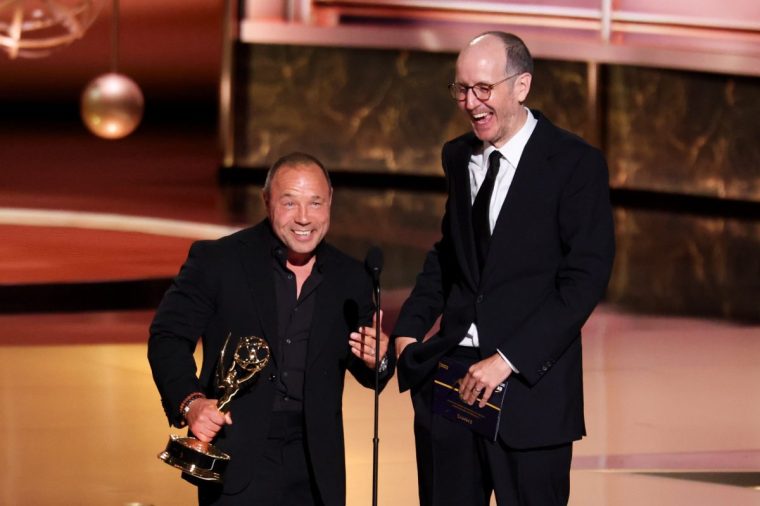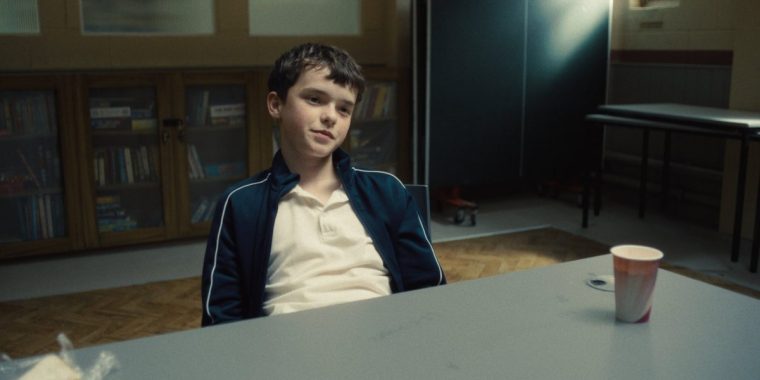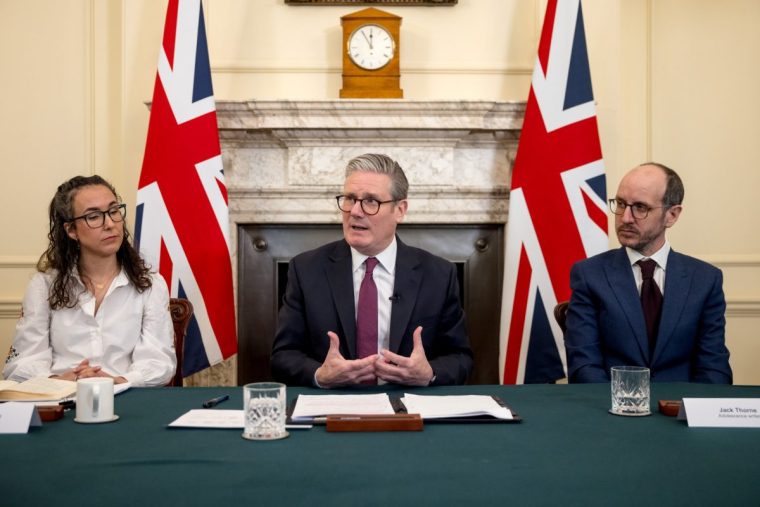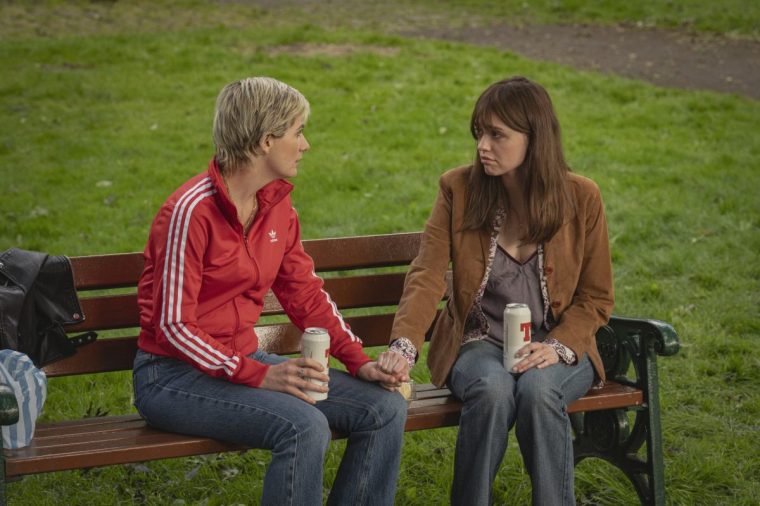Jack Thorne is unusually anxious about his latest TV show. You might think that one of the UK’s most successful writers would be relaxed about these things. He’s not just the co-writer of Adolescence, the most talked-about TV drama of 2025, but the man behind the BBC’s His Dark Materials and the Enola Holmes movies, not to mention blockbuster stage versions of Harry Potter and A Christmas Carol. He’s a serial crowd-pleaser.
The Hack, however, is a tricky one. It’s a seven-part ITV drama about the Guardian’s two-year investigation into the phone-hacking scandal at News UK, which culminated in 2011 with the Leveson inquiry and the closure of the News of the World. Starring David Tennant as the spiky investigative reporter Nick Davies, Toby Jones as his editor Alan Rusbridger, Rosalie Craig as Rebekah Brooks and Steve Pemberton as a terrifying Rupert Murdoch, it’s a hymn to the finest qualities of British journalism – and a condemnation of the very worst.
“It’s a show about journalists that’s going to be judged by journalists,” Thorne says, frowning. “I try really hard not be but I think I’m a bit of a coward and I’m walking into a show where at least half of the media landscape is against you.”
Does he really read his reviews? “I’m pathetic,” he winces. “I can still quote you bad reviews from 2006. Sadly, I’m not strong enough to avoid it but I admire people who are. My brother-in-law is Frank Skinner. He never reads anything.”
![ITV STUDIOS AND STAN For ITV ANND ITVX THE HACK Pictured: STEVE PEMBERTON as Rupert Murdoch and JORDAN RENZO as James Murdoch. This photograph is (C) ITV STUDIOS and can only be reproduced for editorial purposes directly in connection with the programme or event mentioned above, or ITV plc. This photograph must not be manipulated [excluding basic cropping] in a manner which alters the visual appearance of the person photographed deemed detrimental or inappropriate by ITV plc Picture Desk. This photograph must not be syndicated to any other company, publication or website, or permanently archived, without the express written permission of ITV Picture Desk. Full Terms and conditions are available on the website www.itv.com/presscentre/itvpictures/terms For further information please contact: patrick.smith@itv.com TV Still ITV](https://londonnewsnetwork.com/wp-content/uploads/2025/09/SEI_267440409.jpg)
Thorne took on The Hack because he realised that the story was not how he remembered it. The producers of last year’s cause célèbre Mr Bates vs the Post Office invited him to explore how long it took the press, police and politicians to take the Guardian’s allegations seriously. Representing events with scrupulous accuracy was an onerous duty but, at times, weirdly liberating. As the tabloids like to say, you couldn’t make it up. “People don’t behave in the way you would expect them to,” he says. “You wouldn’t get away with it in a truth-adjacent story but in actual fact it happened. You’re carried by the wave of truth.”
Meanwhile, Thorne has some good news to distract him from the reviews. When we speak, he’s just back from Los Angeles, where Adolescence bagged eight Emmy awards, including outstanding writing for Thorne and Stephen Graham. “It was amazing,” he beams. “It was dream-like. I’m still computing exactly what happened.”
Netflix pushed Adolescence hard but its global success is still extraordinary for an unflinchingly intense drama set in northern England with no concessions to an international audience. “No, I don’t understand it,” Thorne admits. “I’ve spent my career being told that British social realism won’t sell in America. When I made Help [his 2021 drama about care homes during the pandemic], we were told, ‘The accents are too strong. It’s too British.’ And these things prove them wrong.”
In the UK, Adolescence triggered a media tempest of acclaim, backlash and thousands of column inches about every aspect of the issues it examined, from the misogynist influencer Andrew Tate to smartphone bans for under 16s. Being in the eye of the storm was a novel experience for Thorne. “It all went a bit wild,” he says. “People were accusing us of race-swapping and forcing an agenda. We were telling Jamie Miller’s story. We weren’t telling the story of every kid in every classroom. There were think pieces on all sides, making vast generalisations. I did get a bit concerned but that seemed to float away.”

Having written his fair share of shows that didn’t get the cultural traction he had hoped for, he won’t complain. “It was my first time experiencing that level of scrutiny and I quite enjoyed it. I found it frustrating at times but if ever a show I did had that kind of attention again, I would welcome people making assumptions about me.”
Thorne is motivated by characters and stories rather than important issues (“I don’t sit there like a pseud ruminating on the world with a cup of mint tea”) but he does have a solid track record of taking on hot-button topics like celebrity sexual abuse scandals (National Treasure), assisted dying (Best Interests) and official negligence (Toxic Town). “The world’s in a bit of a mess right now and TV, this empathy box in the corner of the room, can help.”
You can learn a lot about Thorne’s eclectic career by knowing that his all-time favourite TV show is Boys from the Blackstuff, Alan Bleasdale’s 1982 drama about unemployed labourers, and his favourite film is ET the Extra-Terrestrial (he has the line “Be good” tattooed on his wrist and named his son Elliott.)
Sometimes the two streams merge. He points out that the Enola Holmes movies, at the same time as being cheerful family romps, cover the campaign for mass suffrage and the birth of the trade union movement. “It felt like a way of telling stories through the back door. I think fantasy and social realism are very close bedfellows because they’re both different ways of talking about our world. They all sit on the same roundabout of my head.”

It wasn’t just ET telling Thorne to “be good”. Born in Bristol in 1978, he grew up in a household with a radical left-wing sensibility and dauntingly high expectations. Lightly fictionalised in his play The End of History, his father was a town planner and his mother a carer for people with learning disabilities. They expected him to do something socially useful.
Thorne duly studied politics at Cambridge but had to drop out in his third year due to an extreme heat allergy called cholinergic urticaria and spent the next decade slowly recovering. That experience has led him to write several projects featuring disability, and to make disability access in the TV industry the subject of his passionately indignant 2021 MacTaggart lecture.
This, more than his writing, is how Thorne has made a tangible difference. The lecture prompted all the UK’s major broadcasters to found the TV Access Project, which aims for full inclusion by 2030. “The change I’ve seen in terms of how welcoming the industry is to people I care about has been profound,” he says. “At that first meeting, my Oura [a health tracker ring] thought I was running the entire time because my heart rate was so high. It was the most exciting hour and a half of my life.”
Thorne’s first play, 2005’s When You Cure Me, was a comedy about living with paralysis. During previews, he met Bryan Elsley, the co-creator of a new Channel 4 show called Skins. “He came up to me and said, ‘Do you want to work in TV?’ It was one of those incredibly lucky things.” Skins led to Shameless, which led to the This Is England series. He’s been working with director Shane Meadows and actor Stephen Graham on and off ever since.

Thorne is so in demand that his own ideas often get pushed down the queue by tasty commissions that he can’t refuse, but not everything has worked out. Though he was involved in the early stages of The Rise of Skywalker and Tron: Ares, changes of both director and direction meant that he didn’t make it to the finish line. “I had a vision for it and they didn’t agree with that vision,” he says equably. “That’s the way the industry works. Fundamentally, they didn’t believe in the same bit of the story that I believed in. I can be very sad for a day and then the next day I’m like, ‘OK, what’s next?’ I like working too much to let it stop me.”
There were no such problems with Harry Potter and the Cursed Child, which is still playing to packed houses worldwide almost a decade after it opened, and will possibly run until the end of time. “I’ve just rewritten that show again,” he says. “It’s as old as my kid and I’m still working on it.”
Asking a shy Englishman about money is a form of torture but I wonder whether the play was a life-changer. “In terms of money, er, it changes the landscape in which you, er, circulate. I was living in Luton and it’s given me the opportunity to live in London. But I would be all right if I were living in Luton still.” Most importantly, he says, there are things he doesn’t have to fret about. “My big sister said to me, ‘I’m not worried about what happens when mum and dad get old anymore.’ That’s the luckiest thing in the world.”
His punishing work rate, then, stems from compulsion rather than necessity. “I’m a workaholic,” he admits. “There’s times when it’s damaging and times when it’s useful.” To feel happy, he needs to be working on two projects simultaneously – no more and no less.

This year, though, the competing demands of The Hack, the Channel 4 drama Falling, a BBC adaptation of Lord of the Flies and Sam Mendes’ four Beatles biopics demolished his work-life-balance. Family life (he’s married to comedy agent Rachel Mason) got the short straw. “Both me and Rach feel that it can’t continue for too much longer,” he says with a pained expression. “This year has been the hardest I’ve ever worked in my life. I can’t do this year again.”
Thorne has another long day of writing ahead but before he goes, he reflects on the unpredictability of the streaming age. Adolescence, like Baby Reindeer or Squid Game, has shown that mega-hits can come from anywhere, but he’s concerned that the industry’s current financial contraction is discouraging such gambles.
“When you’re looking for the next Michaela Coel, the next Jimmy McGovern, the next version of my heroes, you just hope that they’re being given the opportunity to stretch their wings,” he says. “In terms of the longevity of the medium, we need those shows. Audiences want more than detective shows.”
‘The Hack’ continues on Wednesday at 9pm on ITV1
